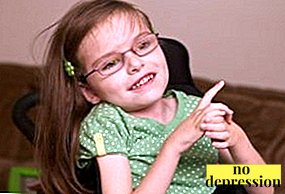The names of the two diseases - Rett syndrome and Tourette syndrome - sound very similar, so people who do not know medicine at the proper level can confuse them.
But these two diseases radically different from each other on symptoms, methods of treatment, prognosis.
To identify Rett and Tourette syndromes in children in time, it is important to know their main features.
What are these diseases?

As mentioned earlier, both of these syndromes similar only names, and in no case should they be confused.
They have only a few minor similarities, including:
- Genetic predisposition. Both syndromes are due to various genetic defects.
- The appearance of the first signs in early childhood. At the same time, Rett syndrome is manifested in children aged from six months to two and a half years, and Tourette syndrome is between two and five years. However, the first signs of Tourette syndrome may appear in adolescence.
Rett syndrome - A genetically determined disease that develops exclusively in girls. In rare cases, it is observed in boys who have an extra X chromosome.
Children with Rett develop normally during the first months of life, but when the disease begins to progress, their physical, mental and psycho-emotional development slows down.
Rett syndrome has developmental stages.
- On the first child development slows down significantly, there are motility disorders.
- On second stage, the child begins to degrade, losing all previously acquired skills and abilities. He stops walking, talking. There is a severe degree of oligophrenia, which will remain with the patient until the end of his life.
- On the third stage of the disease hardly progresses.
- Fourth stage is characterized by aggravation of movement disorders, the child completely loses the ability to move. People with Rett syndrome are not able to serve themselves. They are deeply disabled. To cure this disease is impossible, modern medicine can only extend the life of such patients and improve its quality.

Below, in the "symptoms" section, the features of Rett syndrome will be discussed in more detail.
Tourette syndrome - a genetically caused disease, which is characterized by the presence of a large number of uncontrollable nerve ticks in a child.
For many people with Tourette syndrome, the severity of nervous tics is significantly reduced when they reach adulthood.
The intelligence and health of such people is entirely normal.they can lead a full life and need only the support of relatives and medical and psychological assistance.
More than 60% of patients with Tourette syndrome are boys, men.
Causes of disease

Rett syndrome develops due to presence of a genetic defect, which affects the gene MECP2, indirectly controlling the process of formation of nervous tissue.
If a similar gene defect occurs in a boy, then he dies even during fetal development. Girls survive because they have two X chromosomes.
Tourette syndrome is also directly related to genetics and is often family disease: several family members are sick at once.
Also, the likelihood of Tourette's syndrome increases if close relatives have various involuntary movements (nervous tics, myoclonus, chorea).
Also development of Tourette syndrome associated with the following adverse factors:
- Acute stress in the period of carrying a child. Severe stressful situations include the following: severe illness, death of a loved one or a pet, episodes of violence (sexual, physical, psychological), loss of work, divorce, family problems (regular scandals, conflicts), stressful work.
- Taking medications that are not recommended for pregnant women. There is a huge amount of drugs that can lead to the development of various pathologies in the fetus. Therefore, a pregnant woman needs to consult a doctor before taking any medication, even the one she was prescribed before pregnancy. Diseases that develop during pregnancy are treated using the most benign medicines.
- Bad habits of pregnant women. Smoking, drinking alcohol and taking drugs extremely adversely affect the process of formation of the fetus. It is important for a woman to get rid of bad habits at least several months before conception, in order to increase the likelihood of having a healthy baby.
- Traumatic head injuries during childbirth, hypoxia. Even if qualified specialists work in the maternity hospital, this does not completely exclude the likelihood of various complications during childbirth, which can adversely affect the health and life of the newborn. It is important for parents to take care that births take place in a good clinic and in no case give birth at home.

The likelihood of developing Tourette syndrome in premature babies is increased.
Emotional Injuries and infectious diseases can affect the course of Tourette syndrome.
Symptoms of pathologies
Symptoms characteristic of Rett syndrome, it is most comfortable to consider as part of the stages (see photo).
- The first stage. At birth, girls with Rett syndrome are no different from most healthy newborns, and for the first six months they develop in the same way as their peers. The disease makes itself felt in the interval between six months and two and a half years. The child begins to significantly lag behind in development from peers. The muscles of the child are in a state of hypotonia, growth is delayed, the head grows more slowly. Some girls have deviations in the functioning of the internal organs (liver, cardiovascular system, intestines, stomach).
- The second. Symptoms characteristic of the disease is growing. The child has trouble sleeping (insomnia, frequent waking, excessively sensitive sleep), he looks restless. After this, there comes a short, usually consisting of several weeks, period during which the child degrades: he loses his previously learned skills, stops talking. Observed neurological abnormalities and breathing problems.
- Third. The process of disease progression slows down. The duration of the third stage is ten to eleven years. It begins at four years and ends with the onset of older adolescence. The child has a severe degree of mental retardation, he is not capable of learning. Characterized by the occurrence of epileptic seizures, dyskinesias.
- The fourth. Movement abnormalities progress, the majority of patients lose their ability to move completely. The frequency of epiprystal decreases.

In addition to the main symptoms, there are diseases in Rett syndrome, often occurring in people with motor limitations (muscular atrophy, spinal curvature due to weakness of the muscular system, impaired blood circulation). Patients require constant care.
The main symptoms of Tourette syndrome:
- Dyskinesia. They can be very diverse, they can include motor (jumps, various waving, jerking of limbs), and vocal (singing, making other sounds, including coughing, sniffing). Also, the child can harm himself (bite his lips, fingers, beat his head against something). He can hardly control his nervous tics.
- Feelings are harbingers. Most people with Tourette syndrome report feeling something unpleasant (itching, pain, burning in the eyeballs, feeling something stuck in their throats), and this sensation forces them to perform an action: make a sound, move a limb and so on.
- Moderate behavioral disorders. For children with Tourette syndrome is characterized by the presence of increased irritability, impulsivity. Their mood changes for no apparent reason, it is difficult for them to learn. Tourette syndrome is often combined with ADHD.
Adolescents often suffer from various mental illnesses and disabilities, such as neurosis, depression, various types of social phobias, and anxiety disorder.

The severity of symptoms may vary.
Diagnostics
If the doctor suspects that the child has Rett syndrome, he will refer him to:
- Magnetic resonance imaging. The brain of a child with this disease is reduced in size, smoothness of convolutions is observed.
- Encephalography. The study shows a low level of electrical activity of the brain.
- Genetic studies. Modern analyzes provide an opportunity to determine the presence of mutation with one hundred percent.

Also shown examination of internal organs: in one third of children with this disease, the spleen and liver are in an underdeveloped state.
The diagnosis of "Tourette syndrome" is made on the basis of the symptoms characteristic of this disease.
Disease it is important to differentiate with a number of other neurological diseases that have similar symptoms, such as:
- Chorea of Huntington;
- chorea;
- schizophrenia;
- epilepsy;
- autism spectrum disorders.
To exclude them, the child is referred to a neurologist and psychiatrist. Magnetic resonance imaging, computed tomography, electroencephalography and other studies may be indicated.
Treatment and prognosis
Rett syndrome
Modern medicine unable to cure Rett syndrome, and treatment is aimed solely at alleviating the symptoms that are present in the patient and worsen his quality of life.
Medications are usually prescribed to control the somatic diseases present in a child (diseases of the liver, heart, spleen, stomach, intestines).

In the presence of epileptic seizures anticonvulsants are selected.
Choosing the right anticonvulsant therapy is extremely difficult, as epileptic seizures in Rett syndrome difficult to control.
If a child has difficulty sleeping, he is prescribed a means to help him (a variety of sleeping pills, including melatonin, sedatives).
To prevent the occurrence spinal curvature, it is necessary to ensure that the child has a muscular corset. To do this, with him regularly engaged in doing massage.
Nootropics in the treatment of Rett syndrome show low efficiency, but they are still often prescribed.
The prognosis for this disease is extremely negative: patients suffering from Rett syndrome have a profound disability and must receive continuous care until the end of their lives.
With quality supportive care, patients able to live up to 40-50 years. Adult patients have a high risk of stroke.
About Rett syndrome in this video:
Tourette syndrome
What tactics the doctors choose during treatment depends on the severity of the disease and the age of the child. The basis of the treatment of Turret syndrome - psychotherapy. Actively used:
- Animation therapy. Interaction with animals (horses, cats, dogs, hamsters, guinea pigs, various birds) has a positive effect on the psycho-emotional state of the child: he receives a source of positive emotions and in parallel learns to interact correctly with animals.
- Art therapy. Most often it is drawing (with pencils, paints — not only using a brush, but also with the help of fingers, a sponge), modeling from clay and plasticine, applique, and origami. Older children can be offered burning, wood carving. It also helps them to relieve internal tension, to feel their own importance, to raise self-esteem, to improve concentration and attention.

The psychotherapist tells the child how to deal with nervous tics, talks about how important it is to accept oneself, helps to cope with psycho-emotional upheavals, mental illness.
Children are also shown physical therapy, various types of massage.
If the symptoms characteristic of Tourette syndrome seriously interfere with the child’s life, and sparing treatment methods (exercise therapy, psychotherapy) have not shown the necessary effectiveness, it is prescribed drug support. Usually shown reception:
- antipsychotic drugs (haloperidol, periciazine);
- benzondiazepines (diazepam, phenazepam);
- adrenostimulants (clophelin).
In most patients, the symptoms become less pronounced, and the need to take medication disappears. The prognosis for Tourette syndrome is almost always favorable.
Even people with severe forms of this disease able to lead a full life. But they are very much in need of support from others, often suffer from mental illness (depression, neurosis, phobias).
About Tourette syndrome in this video:
Prevention
The only option for the prevention of Rett syndrome - prenatal genetic tests. If they reveal the presence of this genetic disorder, it is recommended to terminate the pregnancy.
Effective methods to help avoid Tourette syndrome does not exist. If symptoms are characteristic of this disease, it is important to go to the hospital.



